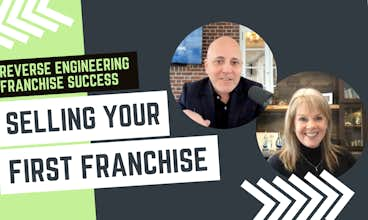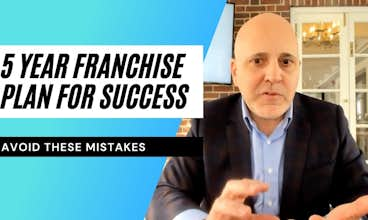Business Coach and former NBA player Walter Bond discusses the importance of building strong systems that support franchisees.
TAKEAWAYS:
Achieving success as a franchisor often means staying the course and putting others' success ahead of your own.
By supporting franchisees in developing their businesses, franchisors can build a solid foundation for their brand’s future growth.
For new and emerging franchisors, developing strong systems while mastering franchising fundamentals and embracing accountability can take your brand to the next level.
When Walter Bond invested in his first franchise, he anticipated building a successful business on the heels of an accomplished career in professional sports.
“As a former athlete, my first business was a franchise, and I loved it because I was handed a playbook. To me, in sports, the coach gives you a playbook and it's your job to master the playbook. And so that's why I love franchising,” says Bond, a business and leadership coach and former National Basketball Association (NBA) player.
Despite having that playbook, though, owning a franchise wasn’t the positive experience Bond had expected when he’d joined the brand as a franchisee. Instead, Bond says he and his wife “lost everything” due to a business model and system he believes didn’t enable his franchise location to thrive, leaving him unable to continue pursuing his goals as he chafed under royalty fees and the oversight of a franchisor he didn’t feel supported by.
But while those losses offered Bond a harsh look at the reality and risks of the franchise industry, they also provided valuable business lessons that would ultimately pay off for the former pro athlete as he embarked on a career that would span over two decades – this time, as an advisor to franchisors and entrepreneurs.
Crafting a playbook for success
For Bond, one of the key lessons from those early experiences as a franchisee was the importance of investing in a brand that can offer a high-quality playbook for its franchisees – one that includes proven systems that support franchisees in their journey as franchise business owners.
“A lot of franchise systems have an entrepreneur who had a great idea, half-baked it and then sold it. They have franchisees who bought into this half-baked idea, and they get frustrated. Before you know it, there's lawsuits and there's lawyers and angry people,” Bond says.
Instead of running with those half-baked franchise concepts, Bond stresses the importance of ensuring a brand’s business model is thoroughly hashed out before selling it to franchisees. Often, that process can include developing and implementing time-tested systems and processes that provide a roadmap to success rather than leaving franchisees with more questions than answers.
“The reality is, people are cashing in their 401(k) for your half-baked idea, running lines of credit for your half-baked idea, borrowing money from their parents for your half-baked idea. Successful systems don't have a half-baked idea. They have a great idea that was converted into a great system and then they keep improving the system,” Bond says.
For franchisors, continuous efforts at improvement and adopting a willingness to acknowledge – and fix – things that go wrong along the way can often make or break the success of a brand.
“Smart brands, strong brands have a foolproof playbook that the franchisee needs to master,” Bond says.
Mastering the fundamentals of franchising
For new and emerging franchisors, mastering the fundamentals of the franchise industry is a critical step in building a sustainable franchise system from the ground up.
“When I look back on our clients that sell for millions of dollars and have hundreds of franchisees, they didn't start off that way. Every year, they kept getting better – marketing, systems, building out – and that continuous improvement is really the key,” says Charles N. Internicola, a franchise attorney with over 25 years of experience and the founder of The Internicola Law Firm.
A key part of that process for franchisors includes determining whether their business is franchisable and knowing the right time to franchise it.
“We get calls all the time from amazing business owners and entrepreneurs. … When they're starting (as franchisors) they'll say, ‘Charles, I franchised two years ago. I was told franchise sales are easy, or I was given all this generic stuff,’ and some of them shouldn't have franchised. Some have amazing businesses, but don't have the tools to succeed because they don't understand the right way,” Internicola says.
For most franchise brands, scaling and expanding beyond the first handful of franchisees often requires years of effort and resources – including developing a franchise operations manual and creating a five-year success plan that establishes milestones for brand growth and includes strategies for over-supporting early franchisees.
“I see some new franchisors that work with a development company, and I see these videos and it's about how great the burger is. It's not about the burger. It's about the transformation of your franchisees – how you're going to transform their lives,” Internicola says.
Although those transformations – and the growth of the franchise brand itself – can often require years of effort and resources, those investments can pay off over time with patience and perseverance.
“We have clients who, in the first four or five years, only sold 10 franchises. But they kept building call centers, improving … and serving their franchisees. So, that looks like slow growth, 10 units in five years. But then when you look at them in year seven and year eight, they're sold out of the country and to private equity. They built that foundation right to scale and grow. … I think if you don't have that mindset, you can't win as a franchisor,” Internicola says.
Accountability as a pathway to success
Beyond a willingness to take time to master the fundamentals of franchising, adopting the right growth mindset and embracing accountability can also be helpful for franchisors hoping to grow their brand sustainably.
“A lot of systems get in trouble, and they just try to sell their way out of it, not by fixing the system. They want to keep selling locations, keep getting franchise fees. But they’re not fixing the problem,” Bond says.
Instead, Bond advises franchisors to focus on supporting their existing franchisees and making sure they have the tools and resources to develop their businesses and achieve their goals.
“My favorite brands are the ones where the franchisor steps up and says, ‘Look, we launched this. We blew it, we made a mistake. Sorry. We’re going to fix that.’ That's family, right? That's family. That's real. Instead of justifying it, making excuses,” Bond says.
In addition to staying accountable and proactive about fixing business mistakes that can hamper franchisees’ ability to thrive, Bond also stresses the importance of putting people first and giving underdogs, like underperforming students, a chance at employment and the opportunity to transform their futures – a risk that can encourage brand loyalty further down the line.
“Kingdoms rise and fall. And so, as a franchise system, you have to learn how to build kingdoms. And the way you build kingdoms is by having loyal people inside your kingdom who are kings and queens themselves,” Bond says, noting the importance of developing people skills as a franchisor.
That emphasis on relationship-building is not only critical for supporting franchisees in their early success but also for supporting brand growth through franchisee validation and internal scaling.
“I have seen brands where the franchisee literally is so happy and so enamored, they buy more and more and more and more (franchise locations). Healthy brands grow internally,” Bond says.
Still, for emerging franchisors looking to scale either internally or externally, it’s important to maintain a realistic perspective and understand that franchising success typically doesn’t happen overnight. Instead, it’s a journey that requires patience, tenacity and a willingness to take the good with the bad while trying to do better each day.
“To me, the journey is the fun part. As long as we don't quit – as long as we learn through the journey what needs to be done, what is required, what is necessary, as long as you don't quit – you can become elite,” Bond says.
To learn more about Walter Bond, visit www.walterbond.com.





